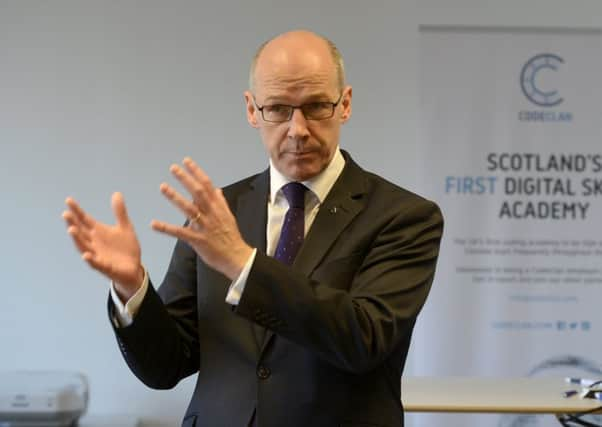All eyes on Swinney as he sets spending agenda


Chancellor George Osborne set out his latest spending plans last Wednesday against the backdrop of the increased forecast for GDP, according to the Office for Budget Responsibility. Indeed, the success of his plans relies heavily on a stable, growing UK economy.
But what does the latest Autumn Statement mean to those of us in an increasingly devolved Scotland? The Autumn Statement and Spending Review is a precursor to the Scottish Government Budget that will be set out by Finance Secretary John Swinney next month. Both have impacts on Scottish spending. It is interesting that there wasn’t as much granular detail in the Autumn Statement as usual, and instead this was about the bigger picture.
Advertisement
Hide AdAdvertisement
Hide AdThe big headlines were related to the U-turn on tax credits, which were lauded as a huge victory for lower income families after a wave of criticism directed at the Chancellor since the summer. However, it is worth holding off on the celebrations. While an estimated 250,000 families across Scotland can breathe an immediate sigh of relief, the plan to introduce Universal Credit across the board is still on the horizon.
This new system could see a two-parent family working full-time with two children up to £1,030 worse off, for example. Although quietening critics for the time being, the impending changes will soon deliver similar challenging impacts to many.
This is just one of many policies that contribute to the growing generation gap. While working age benefits will remain frozen until 2020, state pensions will go up next year by 2.9 per cent – the biggest increase in 15 years. With an ageing population, this divergent approach to the different demographics is likely to have a significant long-term impact.
The UK government is considering a major shake-up of the current pensions tax system, and is expected to announce its decision to implement a system similar to an Isa at next year’s Budget. The housing and property sector also saw significant support – with Osborne committing £20 billion to the cause. Better access to affordable housing is a key objective – improving the stock of affordable homes by 2020-21 and increasing stamp duty to discourage buy-to-let investors in an effort to support those who can’t afford to buy.
These plans are unlikely to impact Scotland directly. However, it will be interesting to see how Swinney addresses these challenges and the recovery of the property and construction sector.
Osborne revealed the Scottish Government’s block grant will increase to £30bn by 2019-20, and that capital spending will increase by £1.9bn by 2020. He flagged this as money to invest in the long-term future of the country. However, Holyrood argues that in real terms public spending will reduce by 5.7 per cent as a result of inflation. It is therefore likely that we will continue to see the impact of reduced resources on the council services we are used to.
Another Westminster announcement was the investment in Scottish cities, which will undoubtedly have an impact on the Scottish economy and consumers. Applying the success of Glasgow’s “City Deal” to Aberdeen and Inverness is pivotal in creating a modern Scotland. Improving public services, transport infrastructure, employment opportunities and consumer spending will contribute massively to sustainable economic growth nationally.
The absence of an announcement in Osborne’s statement that Edinburgh will secure a similar deal was disappointing. However, all is not lost, as a decision is anticipated in early 2016 and, considering it is the UK’s most prosperous city outside of London, the odds are in Edinburgh’s favour. This is a development Swinney is likely to anticipate as he considers Scotland’s financial future.
Advertisement
Hide AdAdvertisement
Hide AdWhile we come to terms with what Westminster’s Autumn Statement means for individuals, public spending and businesses, the Scottish Government’s pending Budget announcement is eagerly anticipated. Although the UK national finances seem to be on track to achieve a surplus budget by 2020, some of the measures announced could be perceived as short-term kneejerk reactions rather than long-term solutions.
Existing uncertainty within the Scottish economy, along with the pressure of achieving increased spending, means that the Finance Secretary needs to plan for the near and distant future.
Although Westminster’s block grant will reduce in “real terms” and public spending will almost certainly be cut, it is clear that finding short-term solutions isn’t viable. The Scottish Government needs to consider the long-term challenges that lie ahead of us and ensure we are supported by innovative policies that will help us build and sustain a vibrant economy.
Vishal Chopra is a tax partner at Grant Thornton